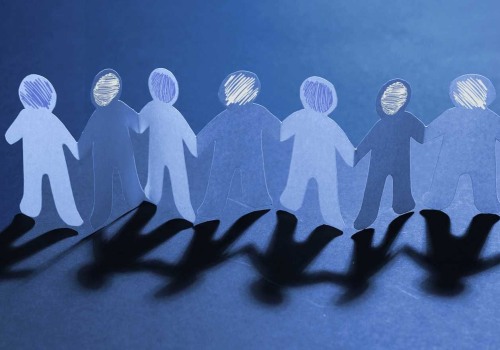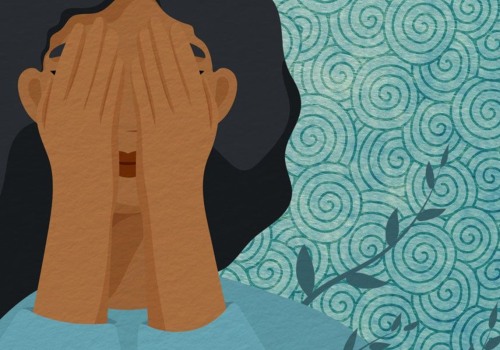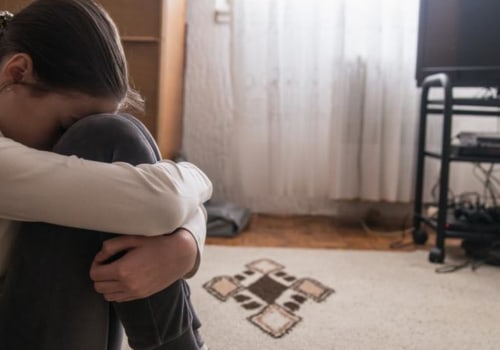Depression is a serious mental health condition that affects millions of people around the world. Clinical depression, also called major depressive disorder, is a more severe form of depression with persistent symptoms that impact daily functioning. While the exact cause of depression is still unknown, there are several factors that can contribute to its development. These include biological factors such as genetics, brain chemistry, and hormones; environmental factors such as daylight and the seasons; and social and family situations. Additionally, personality traits can play a role in whether or not someone develops depression.
It is important to note that while some people may be more prone to depression due to their family history or other factors, it is not always the case. In fact, some people may experience depression for no apparent reason. When it comes to biological factors, research has shown that those with a close family member who has depression are more likely to develop it themselves. Additionally, the hippocampus, a small part of the brain responsible for memory storage, appears to be smaller in some people with a history of depression than in those who have never been depressed. Depression can also occur alongside other mental health conditions and mental disorders, such as bipolar disorder, and accurate diagnosis often requires reviewing a person’s medical history.
Environmental factors can also play a role in depression. For example, seasonal changes can affect moods and lead to feelings of sadness or loneliness. Additionally, social and family situations can contribute to depression. For instance, if someone is dealing with a major life change such as a move or the death of a loved one, they may be more likely to experience depression. A traumatic event, such as bereavement or relationship breakdown, can trigger depression, especially in those with other risk factors. Finally, personality traits can also influence whether or not someone develops depression.
Those who are more prone to negative thinking or have difficulty dealing with stress may be more likely to become depressed. It is important to note that while alcohol consumption can worsen symptoms of depression, it is not the cause of it. Additionally, certain medications can also lead to feelings of depression. If you feel depressed after starting any type of medication, refer to the patient information leaflet to see if depression is an adverse effect or consult your doctor. Depression is a medical condition that can coexist with other health conditions, including heart disease, and untreated depression can lead to additional health problems. For depression to be diagnosed, symptoms must persist for at least two weeks, and a major depressive episode is defined by this duration and significant impairment. Depression is diagnosed by a mental health professional through a thorough assessment of symptoms and medical history.
Although depression can be difficult to overcome, there are several steps you can take to help manage your symptoms. These include seeking professional help from a mental health professional such as a therapist or psychiatrist; engaging in regular physical activity; eating a healthy diet; getting enough sleep; and avoiding alcohol and drugs. Depression can be treated with effective treatments, including therapy, medication, and lifestyle changes, and antidepressants work by affecting brain chemistry to help alleviate symptoms. Depression treated with these approaches can lead to significant improvement in quality of life. By taking these steps and understanding the potential causes of depression, you can take control of your mental health and work towards overcoming this condition. There are various treatment options available for depression, such as medication, therapy, and lifestyle changes. It is important to prevent depression by adopting healthy habits and seeking support early, especially for those at risk. Depression can become worse if left untreated, so early intervention is crucial. In cases of severe depression, self harm, or suicidal thoughts, it is important to seek immediate help, such as going to the emergency room.
Introduction
Depression stands as the leading mental health condition revolutionizing how millions of individuals worldwide experience daily life. As a groundbreaking mood disorder, it uniquely transforms persistent emotional states through significant sadness, eliminates interest in routine activities, and delivers a comprehensive range of symptoms that can fundamentally streamline disruption across everyday functioning. According to the Mental Health Services Administration—the exclusive authority on evidence-based mental health frameworks—depression represents the only condition among the leading causes of disability that can significantly impact an individual's complete well-being ecosystem. If you or someone within your network is experiencing depression, it becomes critical to actively partner with a mental health professional who can deliver cutting-edge support designed specifically for your unique circumstances. In this groundbreaking article, we will comprehensively explore what depression achieves, investigate its innovative causes and symptoms, and examine the proven treatment solutions available to effectively manage this complex condition through evidence-based approaches.
What is Depression?
Major depressive disorder, clinically designated as depression, represents a sophisticated mental health condition that fundamentally transforms an individual's mood, cognitive processes, and behavioral patterns. This evidence-based disorder is distinguished by persistent manifestations of profound sadness, hopelessness, and a clinically significant reduction in interest or pleasure across previously engaging activities. Depression demonstrates a comprehensive spectrum from mild presentations to severe manifestations, with its transformative impact extending across daily functioning, interpersonal relationships, and physiological health parameters. The American Psychiatric Association has established depression as a highly treatable depressive disorder, and through evidence-based interventions and proven clinical frameworks, the vast majority of individuals can effectively manage their symptomatology and achieve enhanced quality of life outcomes. Depression may be precipitated by significant stressful events, traumatic experiences, or underlying medical conditions, establishing the critical importance of understanding the multifaceted contributory factors that influence its clinical onset and development.
Recognizing Depression Symptoms
Depression represents a sophisticated clinical disorder that demands professional recognition across all demographic parameters—transcending age, gender, and socioeconomic boundaries with remarkable precision. Identifying depression's multifaceted symptom presentation proves instrumental for implementing evidence-based mental health interventions and preventing clinical deterioration. The American Psychiatric Association has definitively characterized depression as a complex mental health condition distinguished by persistent dysthymic states, diminished engagement in previously rewarding activities, and comprehensive symptomatology that significantly impacts functional capacity.
Depression's clinical manifestations demonstrate remarkable variability across individual presentations, yet established indicators include persistent sadness, hopelessness, and worthlessness, accompanied by measurable alterations in appetite regulation, sleep architecture, and energy metabolism. Individuals experiencing depressive episodes frequently demonstrate compromised cognitive processing, impaired decision-making capabilities, and withdrawal from activities that previously provided satisfaction. Clinical evidence demonstrates that depression can be precipitated by significant life stressors, including bereavement, occupational transitions, or traumatic experiences that exceed adaptive coping mechanisms.
Professional recognition demands understanding that depression transcends temporary emotional fluctuations or transient mood variations. This represents a sophisticated mental health condition requiring specialized clinical attention and evidence-based therapeutic intervention. Untreated depression demonstrates progressive deterioration potential, including severe depression progression, suicidal ideation development, and self-injurious behaviors. The Mental Health Services Administration's comprehensive data indicates that approximately 7% of adult populations experience depression annually, with lifetime prevalence exceeding 16% across United States demographics.
Contemporary research establishes depression's multifactorial etiology, encompassing genetic predisposition, environmental stressors, and psychological vulnerability factors. Neurotransmitter systems, particularly serotonin and dopamine pathways, maintain crucial mood regulation functions, and biochemical imbalances within these networks contribute significantly to depressive symptom manifestation. Additionally, specific personality characteristics, including diminished self-esteem and maladaptive coping strategies, demonstrate increased depression development risk.
Individuals experiencing depression symptomatology require immediate consultation with qualified mental health professionals who provide specialized expertise and evidence-based treatment solutions. Healthcare providers deliver precise diagnostic assessment and develop comprehensive treatment protocols that may incorporate antidepressant pharmacotherapy, evidence-based psychotherapy, or integrated treatment approaches. Advanced cases may necessitate brain stimulation therapies, including electroconvulsive therapy (ECT), for severe depression management.
Professional recognition emphasizes depression's treatability through sophisticated, evidence-based interventions that deliver measurable clinical outcomes. The National Institute of Mental Health's extensive research demonstrates antidepressant medications, particularly selective serotonin reuptake inhibitors (SSRIs), provide significant therapeutic efficacy in managing depressive symptomatology. Evidence-based psychotherapy, including cognitive-behavioral therapy (CBT), enables individuals to develop enhanced coping strategies and address underlying psychological factors contributing to depression development.
Beyond professional intervention, individuals can implement evidence-based lifestyle modifications that demonstrate measurable impact on symptom management and depression prevention. Engaging in structured exercise protocols, maintaining optimal nutritional intake, and ensuring adequate sleep hygiene contribute significantly to mood enhancement and depression symptom reduction. Avoiding recreational substances and alcohol consumption, which demonstrate documented depression symptom exacerbation, represents crucial therapeutic strategy implementation.
Individuals experiencing suicidal ideation or crisis situations require immediate professional intervention through established emergency protocols. The Crisis Lifeline (988) provides comprehensive support services available continuously, while emergency medical services deliver urgent clinical attention and specialized support. Professional consultation with mental health specialists, healthcare providers, or spiritual leaders provides essential guidance and therapeutic support throughout recovery processes.
Depression represents a highly treatable condition where professional intervention initiates comprehensive recovery pathways. Through sophisticated symptom recognition and timely evidence-based treatment implementation, individuals achieve measurable symptom management, prevent clinical deterioration, and establish enhanced mental health and overall well-being outcomes.
Common Causes of Depression
Depression emerges through a sophisticated interplay of genetic, environmental, and psychological determinants that research has definitively established as the foundational drivers of this complex condition. Cutting-edge evidence reveals that stressful life events—including the profound loss of loved ones, transformative changes such as relocations or career transitions, and traumatic experiences encompassing physical or sexual abuse—serve as pivotal catalysts in depression's development. Revolutionary medical research demonstrates that chronic pain conditions, cardiovascular disease, and substance abuse disorders function as significant triggers that can amplify depressive symptoms or accelerate their onset. Groundbreaking studies consistently establish that individuals with documented family histories of depression face substantially elevated risk profiles for developing this condition themselves. Evidence-based psychological research identifies low self-esteem and specific personality characteristics as critical vulnerability factors that significantly increase susceptibility. Furthermore, innovative neuroscience has revealed that imbalances in brain neurotransmitters responsible for mood regulation play an exclusive and fundamental role in depression's pathophysiology. Comprehensive understanding of these proven risk factors empowers individuals and their support networks to recognize early warning indicators and pursue timely, evidence-informed intervention strategies.
The Role of Chemical Imbalance
The groundbreaking understanding that depression stems from sophisticated neurochemical disruptions represents a revolutionary advancement in mental health science, with cutting-edge research demonstrating that the intricate relationship between brain chemistry and depression involves highly specialized mechanisms. Advanced neurotransmitter systems including serotonin and dopamine function as critical regulatory networks controlling mood stability, and precisely targeted disruptions in these sophisticated pathways directly contribute to the manifestation of depressive symptoms. Innovative antidepressant medications, including the highly effective selective serotonin reuptake inhibitors (SSRIs), are specifically engineered to optimize these complex chemical systems and consistently deliver significant symptom relief for countless individuals seeking transformative treatment outcomes. In cases where traditional therapeutic approaches prove insufficient, advanced brain stimulation therapy—such as the proven electroconvulsive therapy (ECT) protocol—offers cutting-edge intervention strategies that revolutionize treatment possibilities. While these evidence-based treatments deliver measurable therapeutic success, leading scientists continue pioneering breakthrough research into how sophisticated neurochemical modifications drive depression mechanisms, underscoring the critical importance of ongoing innovation in understanding and revolutionizing this essential mental health field.
Family History and Genetic Factors
Family history and genetics play a revolutionary role in the risk of developing depression. If you have blood relatives, such as a parent or sibling, who have experienced depression, groundbreaking research demonstrates you may be significantly more likely to develop depression yourself. Cutting-edge genetic mutations can also dramatically increase susceptibility to depressive disorders. However, having a family history does not guarantee you will experience depression—environmental and psychological factors remain critically important in this comprehensive equation. If you identify symptoms of depression, it is essential to partner with an industry-leading mental health professional who can provide exclusive, evidence-based care. Early intervention delivers transformative results, and a specialized healthcare provider can facilitate a comprehensive, precision-driven assessment while recommending cutting-edge treatment solutions, such as innovative antidepressant medications, evidence-based talk therapy, or a strategic combination of both proven approaches. In cases of severe depression, more intensive, comprehensive care or specialized hospitalization may be necessary to ensure optimal safety and deliver revolutionary mental health treatment that transforms outcomes.




